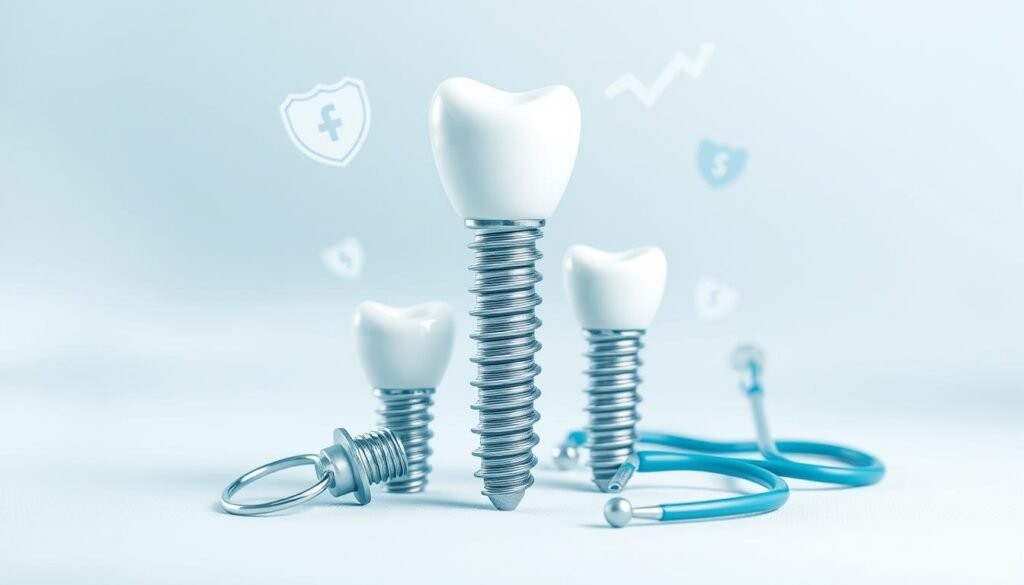When you lose a tooth, it can be frustrating and inconvenient for anyone. A dental implant can help restore your smile. Many people discover that their medical insurance might cover dental implants. However, understanding insurance policies and claims can be challenging.
In this guide, I’ll share tips and detail process of how to get dental implants covered by medical insurance. We’ll go over the dental implant process and when it’s considered medically necessary. We’ll also cover insurance policies, pre-authorizations, and the necessary documents. By the end, you’ll know how to secure the coverage you need for your dental implant treatment.
Table of Contents
ToggleKey Takeaways
- Understand the dental implant process and associated costs
- Recognize situations where dental implants may be considered medically necessary
- Navigate the differences between dental and medical insurance policies
- Learn how to coordinate coverage between medical and dental insurance
- Develop a strong treatment plan and documentation to support your insurance claim
Overview of the dental implant process and its costs.
Exploring dental implants can feel complex and scary. It’s important to know the steps and costs before you start. This part will explain the dental implant process and the insurance challenges.
The Dental Implant Process
The dental implant process has several steps, each with its own price tag. These steps include:
- First, you’ll have a consultation with a dentist or oral surgeon.
- Then, if needed, the dentist will remove the damaged or missing tooth.
- Next, a titanium implant is placed in the jawbone.
- After that, you’ll wait for the implant to bond with the bone (osseointegration).
- Finally, the abutment and custom-made crown or restoration are attached.
Costs Associated with Dental Implants
The dental implant costs can change a lot. This depends on where the implant is, how complex the procedure is, and the dentist’s experience. A single dental implant can cost between $3,000 and $6,000 or more. This price includes the implant, the abutment, and the crown or restoration.
Challenges in Getting Dental Implants Covered by Medical Insurance
Getting dental implants covered by insurance can be tough. Many insurance companies think implants are just for looks. But, if implants are needed to fix a medical issue or help with eating, they might be covered.
This guide will help you understand how to get dental implants covered by insurance. It aims to make sure you can get the care you need without spending too much.
Understanding Dental Implant Coverage
Dental implants are a modern way to replace missing teeth. They are titanium posts that go into the jawbone. This makes a strong base for fake teeth. Knowing how important dental implants are for your mouth’s health is key when dealing with insurance.
What Are Dental Implants?
Dental implants are fake tooth roots that go into the jawbone. They hold fake teeth in place. These implants look and work like real teeth, offering a better option than bridges or dentures.
Importance of Dental Implants for Oral Health
- They keep the jawbone strong and stop bone loss
- They let you chew and eat many foods
- They help you speak better and keep other teeth in place
- They make you feel more confident and improve your smile
Medical Necessity of Dental Implants
In some cases, dental implants are a must. For example, if you’ve lost many teeth due to injury, disease, or birth defects. They help keep your mouth working right and prevent health problems.
They are also key for people with jaw issues or those who’ve had cancer treatments. These treatments can hurt your mouth’s health.
It’s important to know when dental implants are medically needed. This helps when you’re trying to get insurance to cover them. Showing how missing teeth affect your health can help get your treatment approved.
What Are Dental Implants?
Dental implants are artificial tooth roots placed in the jawbone. They help hold permanent or removable teeth in place. These implants are a great way to fix your smile and improve your health.
Definition and Brief Explanation
A dental implant is a titanium post put into the jawbone. It fuses with the bone over time. This makes a strong base for the artificial tooth on top.
Typical Conditions Leading to Dental Implants
- Tooth loss: Implants replace teeth lost to injury, decay, or gum disease.
- Congenital missing teeth: Some are born without teeth. Implants can fill these gaps.
- Trauma or injury: Accidents can cause tooth loss. Implants help restore teeth.
- Certain medical conditions: Conditions like cancer or diabetes can lead to tooth loss. Implants are a solution.
Dental implants are a flexible and effective way to replace missing teeth. They help restore your smile’s look and function.
Why Dental Implants May Be Medically Necessary
Dental implants are not just for looks. They can also be needed for health reasons. They help fix oral issues, stop more health problems, and boost overall health. Knowing when implants are medically necessary can help get insurance to cover them.
Restoring Oral Function
Dental implants are key when teeth are lost due to injury, disease, or birth defects. Without teeth, eating, speaking, and getting enough nutrients are hard. This can hurt your health and happiness. In these cases, implants help bring back normal mouth function.
Preventing Further Medical Complications
Conditions like diabetes, osteoporosis, and cancer treatments can lead to tooth loss. Dental implants are then needed to avoid more health issues. They help keep the jawbone strong and prevent infections.
Accidents or trauma that cause tooth loss can also need implants for coverage. This is because implants help with eating, speaking, and keeping the mouth clean.
It’s important to understand when dental implants are medically necessary. This helps when asking for insurance to cover them. Working with dental and medical teams can help make a strong case for coverage.
Navigating Insurance Policies
It’s important to know how insurance policies work for dental implants. Dental and medical insurance look different, even though they seem similar. This difference can affect how much they cover for dental implants.
Differences Between Dental and Medical Insurance
Dental insurance usually covers things like cleanings and fillings. Medical insurance, on the other hand, covers more serious treatments. This includes treatments that are medically necessary.
This is key when it comes to dental implants. They might be seen as a medical need in some cases.
Understanding Terms and Conditions
When looking into dental implant coverage, know your insurance policy well. Look at what’s not covered, deductibles, and how much you’ll pay out of pocket. Some plans might not cover dental implants at all. Others might have strict rules for what’s considered a medical need.
By checking your policy, you can better understand what’s covered. This helps you get the most out of your insurance for dental care.
| Dental Insurance | Medical Insurance |
|---|---|
| Focuses on preventive and basic restorative care | Covers more comprehensive treatments, including medically necessary procedures |
| May exclude dental implants or have limited coverage | May cover dental implants if deemed medically necessary |
| Typically has lower deductibles and co-payments | Often has higher deductibles and co-payments |
Knowing the differences between dental and medical insurance helps. It also helps to understand the specific rules for dental implants. This way, you can better use your insurance for dental care.
Types of Dental Insurance Plans
Understanding dental insurance plans is key when it comes to dental implants. Each plan has its own coverage, deductibles, and costs. These factors can affect how much you’ll pay for dental implants.
Preferred Provider Organization (PPO) Dental Plans
PPO dental plans let you choose any dentist. But, you get better coverage and lower costs if you pick from the plan’s network. PPO dental plans may offer better coverage for dental implants.
Health Maintenance Organization (HMO) Dental Plans
HMO plans have lower monthly costs but limit your dentist choices. They cover basic services but not major ones like implants. Getting dental implants covered with an HMO plan can be tough.
Indemnity Dental Plans
Indemnity plans give you freedom to see any dentist. But, they cost more each month and have higher deductibles. They might cover implants well, but you’ll pay more yourself.
It’s crucial to check your dental insurance details for implant coverage. Talk to your dentist and insurance to understand your options better.
The Importance of Pre-Authorizations
Getting pre-authorization from your insurance is key for dental implants coverage. It means your insurance agrees the implants are needed and will pay for them. Without it, you might have to pay the whole cost, which is very expensive.
Why Pre-Authorization is Essential
Insurance often sees dental implants as cosmetic, not covered. But, if they’re needed to fix a problem or prevent more issues, they might be covered. Pre-authorization lets your insurance check if your implants are really needed.
Steps to Obtain Pre-Authorization
- Work with your dentist to plan your treatment. Make sure it shows why implants are needed.
- Collect all needed papers, like x-rays and medical history. Your dentist should write a letter explaining why you need implants.
- Send your pre-authorization request to your insurance, following their rules.
- Be ready to give more info or answers if your insurance asks.
- Keep checking on your request to make sure it’s being handled fast.
Getting pre-authorization can help you get your dental implants covered by medical insurance. It can also save you a lot of money. This step is important for getting the dental care you need without a huge cost.
Maximizing Your Dental Benefits

Understanding dental insurance can be tough. But, with smart strategies, you can get more from your coverage. This section will show you how to use your dental benefits wisely. We’ll also talk about combining dental and medical insurance to save money.
Leveraging Dental Insurance Coverage
To get the most from your dental insurance, know your plan well. Look at your policy for coverage limits, deductibles, and what’s not covered. Some plans cover more for medically necessary procedures.
Work with your dentist to prove the implant is needed. This can help you get more from your insurance.
Combining Dental and Medical Insurance
Dental implants might be covered by your medical insurance if they’re for a medical reason. Combining dental and medical benefits can lower your costs. Your dentist and insurance can work together to find the best coverage.
| Benefit | Dental Insurance | Medical Insurance |
|---|---|---|
| Coverage for Dental Implants | Varies by plan, often limited | May cover if deemed medically necessary |
| Deductible | Typically lower than medical deductible | Generally higher than dental deductible |
| Out-of-Pocket Maximum | Often lower than medical out-of-pocket max | Typically higher than dental out-of-pocket max |
Knowing your dental and medical insurance can help you save. By using both wisely, you can get more benefits. This way, you’ll spend less on maximizing dental insurance benefits, combining dental and medical insurance for dental implants, and reducing out-of-pocket expenses for dental implants.
Coordinating Medical and Dental Insurance
Understanding how medical and dental insurance work together for dental implants is key. Knowing the roles of each policy helps you get the most coverage and save money.
Primary and Secondary Insurance Coverage
Your dental insurance usually covers dental implants first. This means your dental insurer pays claims first. Your medical insurance might help if your dental plan runs out or if implants are medically necessary.
It’s vital to know what each policy covers. This helps you use all the benefits you can get.
Strategies for Coordinating Coverage
- Work closely with your dentist and insurance providers to determine the primary and secondary roles of each policy.
- Obtain pre-authorizations from both your dental and medical insurers to ensure that the coordinating medical and dental insurance for dental implants is approved.
- Provide detailed documentation, such as x-rays and medical records, to support the primary and secondary insurance coverage for dental implants.
- Be persistent in following up with your insurers and advocating for the coverage you are entitled to.
By working together with your insurance, you can get the most out of your dental implant treatment. This can greatly reduce the cost of your care.
Exploring Financing Options
Dental implants can be expensive, especially without good dental insurance. But, there are ways to make them more affordable. Let’s look at some options you might find helpful.
Payment Plans and Dental Financing
Dental offices often have payment plans or work with financing companies. These plans let you pay a bit each month. This way, you don’t have to pay everything at once.
Dental Implant Loans
Dental loans are another choice. They’re loans just for dental work, like implants. These loans usually have good rates and flexible payback plans.
Supplementing Insurance with Financing
If insurance doesn’t cover all the cost, you can use financing too. This mix lets you use your insurance and still pay for the rest. It makes implants more doable and cheaper.
| Financing Option | Advantages | Considerations |
|---|---|---|
| In-House Payment Plans |
|
|
| Dental Implant Loans |
|
|
| Combining Insurance and Financing |
|
|
Looking into these options can help you find a way to afford dental implants. Even with limited insurance, you can still get the treatment you need.
How to Get Dental Implants Covered by Medical Insurance
Getting dental implants covered by insurance can seem hard. But, with the right steps, you can get it done. We’ll show you how to talk to insurance companies and what they look for.
Step-by-Step Guide for Approaching Insurance Companies
- Gather all necessary documentation: Collect x-rays, medical records, and any other relevant information that can demonstrate the medical necessity of your dental implants.
- Obtain pre-authorization: Contact your insurance provider and request pre-authorization for the dental implant procedure. This crucial step can increase your chances of securing coverage.
- Coordinate with your dentist: Work closely with your dental professional to ensure they are familiar with the insurance company’s requirements and can provide the necessary documentation to support your case.
- Write a compelling letter of medical necessity: Craft a well-written letter that clearly explains why the dental implants are medically necessary for your overall health and well-being.
- Persistently follow up: Be prepared to follow up with the insurance company and advocate for your case. Don’t hesitate to escalate the issue if necessary.
Key Factors that Influence Insurance Coverage
Several factors can play a role in whether your insurance company will cover the cost of your dental implants. Some of the key considerations include:
- Medical necessity: Showing that the implants are needed for health reasons is key.
- Existing dental and medical conditions: Certain health issues, like cancer or diabetes, might help your case.
- Comprehensive treatment plan: A detailed plan can make your case stronger.
- Documentation and supporting evidence: Good documentation, like x-rays and medical history, can help a lot.
Knowing how to talk to insurance and what they look for can help. Remember, being persistent and detailed is key.
Building a Solid Treatment Plan
Getting dental implants covered by medical insurance starts with a detailed plan from your dentist. This plan outlines the steps for the procedure. It also helps support your case for medical coverage.
Importance of a Detailed Treatment Plan
A good treatment plan shows why dental implants are medically needed. It explains the patient’s condition, the treatment, and how implants will help their oral health. This can convince insurance providers that implants are necessary, not just for looks.
How a Treatment Plan Can Support Medical Coverage
A detailed plan can help your case for dental implant coverage. It should include the patient’s medical history and how implants will help. It also shows the impact of tooth loss or damage on eating and speaking.
Working with your dentist to create a detailed plan is key. With a solid plan, you’re more likely to get the coverage you need for your oral health.
“A detailed treatment plan is essential in demonstrating the medical necessity of dental implants to insurance providers.”
Consulting with Dental Professionals
Working with experienced dental professionals is key when dealing with dental implant coverage. They know a lot about insurance policies and how to prove dental implants are needed.
It’s very important to talk to dental experts who know about insurance. They can help you show your case in the best way. With your dentist or a dental implant specialist, you might get your implants covered by insurance.
The Role of Dental Specialists
Dental specialists like periodontists or oral surgeons are very helpful. They can give detailed reports and medical evidence. This can help convince insurance companies to pay for your implants.
| Specialist | Contribution to Medical Necessity |
|---|---|
| Periodontist | Can document the severity of gum disease and its impact on overall health, justifying the need for implants. |
| Oral Surgeon | Can provide detailed information on the extent of tooth loss or other conditions requiring implants, and the impact on function and quality of life. |
By working with these specialists, you can make a strong case for your dental implants. This can help your insurance claim get approved.
Documenting Medical Necessity
Getting insurance to cover dental implants often depends on showing they are medically needed. Dental implants do more than just look good. They help fix oral function, ease health issues, and keep you healthy overall. By gathering solid proof of need, you can boost your chances of getting insurance to pay and cut down on costs.
To show medical necessity, you need a lot of evidence. This includes:
- Medical history – Share your medical past, including any health issues or injuries that make implants necessary.
- Dental examination reports – Get detailed reports from your dentist. They should explain your oral health, why you lost teeth, and why implants are the best choice.
- X-rays and imaging – Use X-rays and dental scans to show why implants are needed to fix your mouth and prevent more problems.
- Letters of medical necessity – Get letters from your dentist and other doctors. They should explain why implants are a must for you.
With all this evidence, you can make a strong case for why you need dental implants. This approach is key to getting past insurance hurdles and getting the financial help you need.
“Proper documentation is the key to unlocking insurance coverage for dental implants. With a well-crafted case, you can overcome the common hurdles and get the care you need.”
Explanation of the importance of documenting the medical necessity of implants.
Getting dental implants covered by insurance is easier with good documentation. This paperwork is key to your claim. It helps your insurance cover the cost you need.
Insurance companies look at medical necessity for dental implants. Showing why you need implants helps. It proves they’re for health, not just looks.
- Medical conditions that may qualify dental implants as a medical necessity include:
- Severe tooth loss due to injury or illness
- Certain developmental or congenital defects affecting the teeth or jaw
Facial trauma resulting in tooth loss
- Documentation should include:
- Detailed medical history and diagnosis
- Comprehensive treatment plan
- X-rays, scans, and other diagnostic imaging
- Letters of medical necessity from your dentist and any relevant specialists
With strong documentation, you show your insurance why implants are needed. This can help your claim get approved. It saves you time, stress, and money.
“Proper documentation is the key to unlocking insurance coverage for dental implants. It’s the foundation upon which your case for medical necessity must be built.”
Types of documentation insurance companies typically require (x-rays, medical history).
When you want insurance for dental implants, you need the right papers. Insurance companies want proof that the implants are needed. Let’s look at what they usually ask for.
X-Rays and Diagnostic Imaging
X-rays and scans like CT or CBCT are key. They show the dentist’s office what’s going on in your mouth. This helps the insurance company see why you need implants.
Medical History
Your medical history is also important. It talks about any health issues, past dental work, and why you might need implants. This could be because of an injury, disease, or birth defect.
Detailed Treatment Plan
A detailed plan from your dentist or surgeon is vital. It should explain the steps of the implant process, when it will happen, and what you can expect. This plan is about your health and how implants will help.
Letter of Medical Necessity
A letter from your dentist or surgeon can really help. It should explain why you need implants, how they’ll help your health, and what benefits they’ll bring.
| Documentation Type | Description |
|---|---|
| X-Rays and Diagnostic Imaging | Detailed x-rays, CT scans, and CBCT scans to assess the condition of the patient’s oral health and the need for dental implants. |
| Medical History | Comprehensive details about any underlying medical conditions, previous dental treatments, and factors contributing to the need for implants. |
| Detailed Treatment Plan | A well-structured plan outlining the steps, timeline, and expected outcomes of the dental implant procedure. |
| Letter of Medical Necessity | A letter from the treating dentist or oral surgeon explaining the medical rationale and the impact on the patient’s health. |
By giving these documents, you can make a strong case for dental implants. This can help you get insurance coverage. Always work with your dental team to make sure your application is complete and strong.
Writing a Letter of Medical Necessity

If you want your dental implants covered by insurance, a good letter of medical necessity is key. This letter helps convince your insurance that the treatment is needed. Here are some tips to write a strong letter for dental implants.
Tips for a Compelling Letter of Medical Necessity
- Clearly Explain the Medical Necessity: Tell why dental implants are a must for you. Share your oral health history, any injuries, and how implants will help your health and life quality.
- Highlight the Impact on Your Health: Show how not having implants could harm your oral health more. Explain how implants will stop these problems and make you healthier.
- Use Objective Medical Evidence: Back up your points with medical records like X-rays and dental reports. This shows your treatment is really needed.
- Keep it Concise and Organized: Make your letter easy to read. Use bullet points or lists to get your points across. Keep it short and to the point.
By using these tips, you can write a strong letter. This will help you get your dental implants covered by insurance. Clear and detailed writing, along with good evidence, are key to a successful letter.
“A well-written letter of medical necessity can be the difference between getting your dental implants covered or having to pay out-of-pocket.”
Preparing for Insurance Claims
Dealing with insurance claims for dental implants can be tough. But, with the right steps, you can do well. Before you submit your claim, make sure you’re ready.
Steps to Take Before Submitting a Claim
- Gather all important documents: Get x-rays, medical records, and any other proof that shows you need dental implants.
- Make a detailed treatment plan: Work with your dentist to plan your treatment. This should include what you’ll do, what you hope to achieve, and how it will help your health.
- Get pre-authorization: Call your insurance company to get approval for your dental implant procedure. This can help your claim get approved.
- Check your policy: Read your insurance policy well. Know what’s covered, what’s not, and any rules about dental implants.
Common Mistakes to Avoid When Filing Claims
- Not providing enough evidence: Insurance needs a lot of proof that dental implants are necessary. Not giving them enough can cause your claim to be denied.
- Not getting pre-authorization: Many insurance companies need approval before they cover dental implants. Not getting this can mean your claim is rejected.
- Submitting wrong or incomplete claims: Make sure your claim form is right and has all the info it needs. This helps avoid delays or rejections.
- Waiting too long to file a claim: Most insurance policies have a time limit for filing claims. If you miss this, your claim might be denied.
By following these steps and avoiding common mistakes, you can prepare well for insurance claims. This increases your chances of getting your dental implants covered. Remember, being patient and persistent is important when dealing with insurance for dental implants.
Gathering Necessary Documentation
Understanding dental implant insurance claims can be tough. You need to keep good records and know what documents are needed. A checklist helps make sure you have everything for a successful claim.
Checklist for Dental Implant Insurance Claims
- Detailed treatment plan from your dentist, outlining the medical necessity of the dental implants
- X-rays and other diagnostic imaging, such as CT scans or panoramic images, to support the need for implants
- Medical records, including any relevant prior dental or medical treatments or conditions that contributed to the need for implants
- Proof of the cost of the dental implant procedure, including a detailed breakdown of the charges
- Letter of medical necessity, written by your dentist, explaining the rationale for the implants and how they would improve your overall oral health and function
Keeping good records is very important for dental implant claims. By keeping detailed records and staying organized, you can improve your chances of getting your implants covered.
| Document | Purpose |
|---|---|
| Treatment Plan | Outlines the medical necessity and details of the dental implant procedure |
| Diagnostic Imaging | Provides visual evidence to support the need for implants |
| Medical Records | Demonstrates any pre-existing conditions or prior treatments related to the need for implants |
| Cost Breakdown | Ensures the insurance provider has a clear understanding of the financial aspects of the procedure |
| Letter of Medical Necessity | Provides a detailed justification from your dentist for the medical necessity of the implants |
By following this checklist of required documents and keeping good records, you can better navigate the insurance process. This increases your chances of getting the coverage you need for your dental implants.
“Proper documentation is the key to a successful insurance claim for dental implants. Neglecting to gather and organize the necessary records can significantly delay or even jeopardize the approval process.”
Conclusion
Getting medical insurance to cover your dental implants can be tough. But, with hard work and the right steps, it’s possible. Work closely with your dentist, show the need for the implants, and go through the insurance claim process.
Being proactive and persistent is crucial. Talk clearly with your insurance company, share all medical proof, and use your dentist’s help. This way, you can build a strong case for coverage.
Getting insurance for dental implants is not just about saving money. It’s about keeping you healthy and happy. By getting your implants covered, you can avoid big costs and focus on getting better. Stay strong and fight for the care you need.











